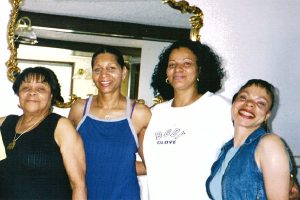A Tale of Two Sisters: How colonoscopies save lives
 When Barbara Bailey had her first colonoscopy, PacMed doctors found and removed a number of precancerous polyps. Then her sister, just a year older, died of colon cancer.
When Barbara Bailey had her first colonoscopy, PacMed doctors found and removed a number of precancerous polyps. Then her sister, just a year older, died of colon cancer.
“It was not nice to look at my sister in that condition—it was terrible,” says Barbara. “She had got to the point where she was too far gone, and she couldn’t even get chemotherapy. If I can prevent that for myself—even if I was to come down with colon cancer, perhaps they can catch it at the beginning, and maybe something can be done.”
“I always make sure that I told my children that, when they get a certain age, that they need to make sure they have colonoscopy testing,” Barbara adds.
According to Dr. John Brooling at PacMed, “African Americans should begin screening at age 45 due to higher mortality and incidence. If you have a family history, you should talk to your doctor to determine the right age for you.” As a general rule, a person without a family history of colon cancer should begin screening at age 45, according to recently updated guidelines.
Since her polyps form quickly, Barbara has yearly colonoscopies, at the recommendation of her physician, Dr. Rex Cheng, who works with Dr. Brooling as part of PacMed’s Gastroenterology team.
“It made me feel like it was really important to me to continue having colonoscopies done,” says Barbara, “because [colon cancer] could possibly happen to me, and if so, I want to be ahead of it, before it got to Stage IV or something. It made me look at what I really need to do.”
As Dr. Brooling explains, a colonoscopy is the best available screening test to detect colorectal cancer. “During a colonoscopy, the doctor examines the lining of your entire colon to check for polyps or tumors. The procedure itself usually goes pretty smoothly. We do put people to sleep, which involves a degree of risk, but we closely monitor the patient throughout the entire procedure. Also, our anesthesia team at PacMed now uses propofol, so the sedation puts people to sleep deeper, but they wake up quicker and are not as groggy.”
The “prep” process that cleans out the colon and rectum prior to a colonoscopy may deter some people from getting this important screening. However, newer kits are available that may make the prep more tolerable. “If you don’t want to do a colonoscopy, there are other options such as annual stool tests,” says Dr. Brooling, “but those are meant to detect early cancer, whereas with a colonoscopy, we can pick up precancerous lesions and take them out before they even turn into cancer.”
Once you have your first colonoscopy, follow-up screenings are recommended every five to 10 years, or more frequently depending on family history and other health factors. If you have certain issues such as chronic diarrhea, bleeding, unexplained weight loss or anemia, you should consult your doctor—whether or not you’ve had your first colonoscopy.
Dr. Brooling says, “There are only so many things people can prevent, and colon cancer is one of them. That’s why I recommend people get screened at the appropriate intervals. One benefit of our gastroenterology practice at PacMed is that we can now get patients in for the procedure within a few weeks.”
Barbara is 70 now, a Seattle resident since the age of 6 and still going strong. She thinks insurance should pay for genetic testing for families that experience colon cancer. If she had one thing to tell the community at this point about her experience, it would be this:
“I think I would tell them, first—if they have any relatives that have died or have had colon cancer, it is very, very important that they also get screened. Especially in the Afro-American community, because a lot of Afro-Americans do die of colon cancer because of not getting colonoscopies, that may prevent them from dying. So they should always get colonoscopies, and family members should encourage them to.”
If you’re looking to schedule a colonoscopy or have questions, please contact us at PacMed. We’re here to help you stay healthy.
Both gastroenterologists featured can be visited downtown at our First Hill clinic. You can also see Dr. Brooling in Renton or Dr. Cheng in Canyon Park (Bothell). Call 1.888.472.2633 for an appointment.


